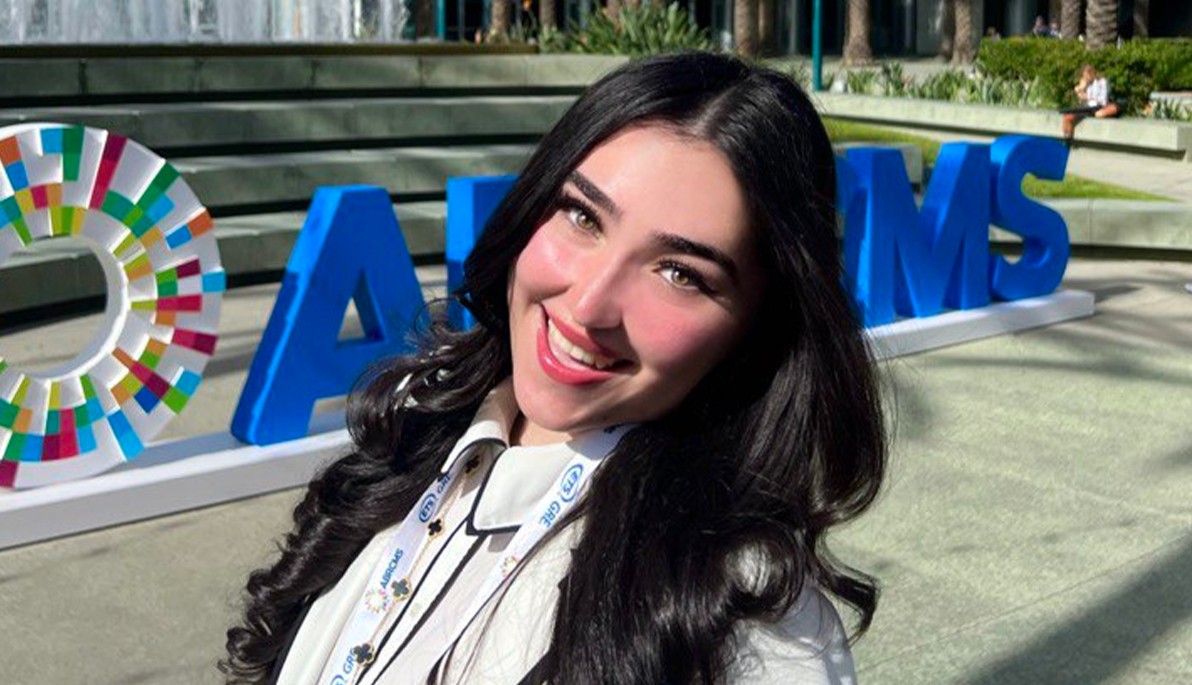
New York Tech Student Headed to Harvard
April 25, 2023
Pictured: Yllka Valdez at the Annual Biomedical Research Conference for Minoritized Scientists in Anaheim, Calif.
Yllka Valdez was accepted into the Harvard/MIT Equitable Access to Research Training M.D.–Ph.D. Summer Program (HEART) within the Summer Honors Undergraduate Research Program (SHURP).
SHURP is a 10-week program that seeks to provide underrepresented minority college students an opportunity to gain training and mentorship in scientific research. HEART is a specialty track under SHURP and is focused on undergraduate students interested in pursuing an M.D. or a Ph.D. It was established by Harvard/MIT medical students in response to a need to increase diversity in the physician-scientist profession.
Beginning in May, Valdez will work on a project that focuses on basal cells within the nasal cavity of patients who may be infected with COVID-19 or other viral infections that cause inflammation of the nasal cavity. “Basal cells are a type of cell found in the bottom layer of the epidermis, the outermost layer of the skin. They are responsible for the production of new skin cells, which then migrate to the surface of the skin as they mature,” she explains. “Basal cells play an essential role in the process of skin regeneration and repair, and they are also important in maintaining the integrity of the skin barrier, which helps to protect the body from infection and dehydration.”
This isn’t Valdez’s first experience as a summer intern. In summer 2022, she was accepted to the Johns Hopkins University of Medicine Careers In Science and Medicine Summer Internship Program, where she investigated the dysfunction of the ADP/ATP carrier protein (AAC in yeast and ANT in humans) of the mitochondria in humans. Mitochondria are small structures in cells that convert substances in food people eat into energy. Adenosine triphosphate (ATP) is the energy used by an organism that, after a simple reaction, is converted to adenosine diphosphate (ADP).
“We found that a fat molecule called cardiolipin helps the Aac2 gene work with other proteins to produce energy efficiently.” Valdez studied a patient with a genetic mutation in the human version of Aac (ANT1), which caused mitochondrial dysfunction and a condition called mitochondrial myopathy (forms of mitochondrial disease that cause muscle problems). “We wanted to understand how this mutation affected the protein, so we compared it to a similar mutation in yeast,” she says. “We found that the mutation caused problems with the interaction between Aac2 and cardiolipin, which made the protein unstable and caused problems with energy production.”
Through travel awards from New York Tech and the lab she worked in at John Hopkins University, she presented the research at the Annual Biomedical Research Conference for Minoritized Scientists in Anaheim, Calif., in November 2022.
“I could not have done this without the support of my mentors and professors at New York Tech,” says Valdez. “I am thrilled to represent our institution during my time in Boston.”
Valdez is pursuing a bachelor’s degree in interdisciplinary studies, with concentrations in English, humanities, and life sciences. She hopes to pursue a career as a physician-scientist. By studying different disciplines, she says she has a unique perspective in science and medicine. “What I love most about my major is the intersection between the arts and sciences. By exploring both fields, I am able to develop a unique and holistic perspective of the human experience, and I believe that this understanding will make me a more compassionate and empathetic physician in the future,” she says. “For example, studying literature and philosophy has taught me about the importance of diverse perspectives and the ways in which people can experience the world differently. This has helped me to develop a deeper appreciation for the cultural and social factors that can impact a patient’s health and well-being. At the same time, studying the life sciences has given me a solid foundation in the biological and physiological processes that underpin health and disease.”
More Features

An Alumnus’ Commitment to the Environment
As an energy management graduate from New York Tech’s Vancouver campus, Jasdeep Gulati (M.S. ’22) is highly invested in educating people about environmental and climate sustainability.

Vancouver Faculty Win University-Sponsored Research Awards in New Program
The new Global Impact Research Grant (GIRG) program has been developed to keep Vancouver-based faculty connected to faculty and research projects being conducted on the university’s New York campuses.

Studying Climate Change One Degree at a Time
Junhua Qu (M.S. ’24) began her collegiate journey in Beijing. But, her interest in climate change took her to New York Tech’s Vancouver campus to study energy management.
